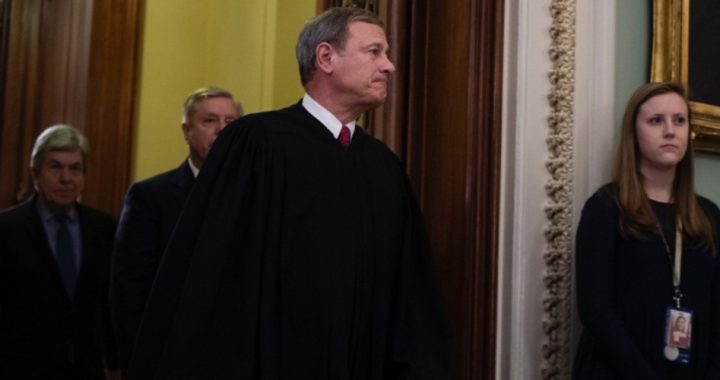
Pro-lifers are hopeful June Medical Services v. Russo may be the catalyst to undo the damage of Roe v. Wade, but Supreme Court Chief Justice John Roberts may have tipped his hand at Wednesday’s hearing and hinted that he could side with the liberal justices.
The case in question addresses the legality of a 2014 Louisiana law, which requires abortion doctors to have admitting privileges at a nearby hospital within 30 miles of their clinic. The case also explores whether abortion providers have the right to go to court over laws such as Louisiana’s that restrict their services.
Democratic State Representative Katrina Jackson called her legislation a “common sense women’s health piece of legislation” in an interview with CBS News last year.
“A physician with admitting privileges has the ability to call ahead of time if there was a complication,” Jackson said. “When you don’t have no connection with the hospital within a 30 mile radius, you have absolutely no connection with the hospital.”
The law has been upheld by the Fifth Circuit Court of Appeals, but plaintiffs in the case claim the law conflicts with Whole Woman’s Health v. Hellerstedt, which ultimately struck down a similar law in Texas that also required abortion doctors to have admitting privilege.
Louisiana solicitor general Liz Murrill, who is defending the state’s law before the high court, contends that the law differs from the Texas law because the “regulatory structure is different,” adding that doctors in the state “could get privileges.”
In its ruling to uphold the Louisiana law, a panel of the Fifth Circuit Court also found distinctions between the two laws.
Writing for the majority, Judge Jerry E. Smith said a closer look at the details revealed the court’s decision did not conflict with the Supreme Court’s ruling in Woman’s Health. “Unlike in Texas, the [Louisiana law] does not impose a substantial burden on a large fraction of women,” he concluded.
News outlets claim that while many of the Supreme Court justices made their positions clear and did not appear to stray from their ideologies during Wednesday’s hearing, Justice Roberts emerged as the potential deciding vote, though his own position remains unreadable at the moment, with outlets such as CNBC arguing he could side with the liberal justices and CNN claiming he may be laying the groundwork to limit abortion.
According to Reuters, both Justice Roberts and conservative Justice Brett Kavanaugh asked questions that “suggested they — and perhaps other conservative justices — do not believe the Louisiana law is automatically doomed by a 2016 Supreme Court precedent that struck down similar admitting privileges restrictions in Texas.”
For example, Justice Kavanaugh asked whether admitting privileges would be constitutional if they did not impose burdens.
“Are you saying admitting-privileges requirements are always unconstitutional, such that we don’t have to look at the facts state by state?” Kavanaugh asked.
But Justice Roberts also suggested that he viewed Whole Woman’s Health as “binding,” according to CNBC, and repeatedly questioned whether Louisiana’s law had the same benefits as the Texas at the center of Woman’s Health, which ruled the Texas law ultimately had no medical benefits and created an unconstitutional burden on women.
Roberts asked both sides whether it was up to the court to pursue a state-by-state analysis of abortion restrictions, a question that could be read one of two ways, according to the Washington Post: “That could indicate he felt he could distinguish Louisiana’s law from the Texas statute. Or it could mean he agreed with challengers that similar laws were doomed because of the court’s precedent from 2016.”
Both sides are in agreement that the Supreme Court’s ruling in this case could be momentous. If the court upholds the Louisiana law, it could mean the court is ready to revisit past decisions related to abortion.
Tensions were high on Wednesday as members of Congress appeared at competing rallies outside of the courtroom, one in support of life and the other comprised of abortion advocates. Senate Minority Leader Chuck Schumer stirred controversy when he spoke to the pro-abortion crowd and called out Justices Gorsuch and Kavanaugh specifically.
“I want to tell you, Gorsuch, I want to tell you, Kavanaugh, you have released the whirlwind and you will pay the price,” the New York Democrat said. “You won’t know what hit you if you go forward with these awful decisions.”
Schumer’s comments later provoked a rare rebuke from Justice Roberts.
“Justices know that criticism comes with the territory, but threatening statements of this sort from the highest levels of government are not only inappropriate, they are dangerous. All Members of the Court will continue to do their job, without fear or favor, from whatever quarter,” Roberts wrote.
A ruling from the high court is expected to come at the end of June.
Photo: AP Images
Raven Clabough acquired her bachelor’s and master’s degrees in English at the University of Albany in upstate New York. She currently lives in Pennsylvania and has been a writer for The New American since 2010.




